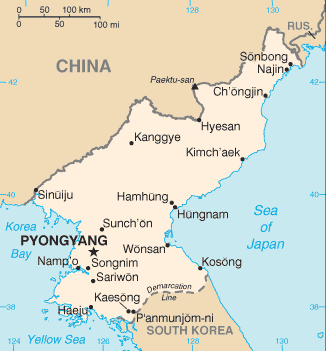North Korea
 Map Courtesy CIA World Factbook |
North Korea, known officially as the Democratic People's Republic of Korea, is a country in eastern Asia, covering the northern half of the peninsula of Korea. To the south it borders South Korea with which it formed a single nation until 1948. Its northern border is predominantly with the People's Republic of China, and a small section with Russia. Locally and in mainland China, it is more commonly called Pukchosŏn, a name that associates the country with the Joseon Dynasty. Bukhan is commonly used in South Korea.
Japanese rule of Korea ended after World War II in 1945. Korea was occupied by the Soviet Union north of the 38th Parallel and by the United States south of the 38th parallel, but the United States and the Soviet Union were unable to agree on implementation of Joint Trusteeship over Korea. This led in 1948 to the establishment of separate governments in the north and south, each claiming to be the legitimate government over all of Korea.
Growing tensions between the governments in the north and south eventually led to the Korean War, when on June 25, 1950 the (North) Korean People's Army crossed the 38th Parallel and attacked in force. The war continued until July 27, 1953, when William Harrison Jr., United Nations Command, and Nam Il, Delegation of Korean People's Army and the Chinese People's Volunteers, signed the Korean War Armistice Agreement. The demilitarized zone, or DMZ, was established to separate the two countries.
North Korea was ruled from 1948 by Kim Il-sung until his death on July 8, 1994. After the death of Kim Il Sung, his son Kim Jong-il was named General Secretary of the Korean Workers' Party on October 8, 1997. In 1998, the legislature reconfirmed him as Chairman of the National Defence Commission and declared that position as the "highest office of state." International relations generally improved, and there was a historic North-South summit in June 2000. However, tensions recently increased when North Korea resumed its nuclear weapons program.
During Kim Jong Il's rule during the mid to late 1990s, the country's economy declined significantly, and food shortages developed in many areas. According to aid groups, a significant but unknown number of people in rural areas starved to death due to famine, exacerbated by a collapse in the food distribution system. Large numbers of North Koreans illegally entered the People's Republic of China in search of food, and there were also stories of cannibalism.
North Korea has remained one of the most isolated places in the world, with severe restrictions on travelling in or out of the country. North Korea lacks a free press. Juche, created by Kim Il-Sung, is the state endorsed ideology of North Korea. Juche is based on self-reliance.
North Korea announced on February 10, 2005 that it has nuclear weapons. The DPRK withdrew from the six-party talks because the North Koreans claimed that the United States had "hostile intentions" towards their country. It is due to this nuclear capability, the United States has placed North Korea into the Axis of Evil, as the nation is an Outpost of Tyranny. The DPRK wanted removal from this status before resuming talks which are aimed at curbing its WMD programme.
On May 7, 2005 the USA announced its spy satellites had discovered possible preparations for North Korea's first test of a nuclear weapon. According to the images, the North Koreans are preparing for an underground test.
